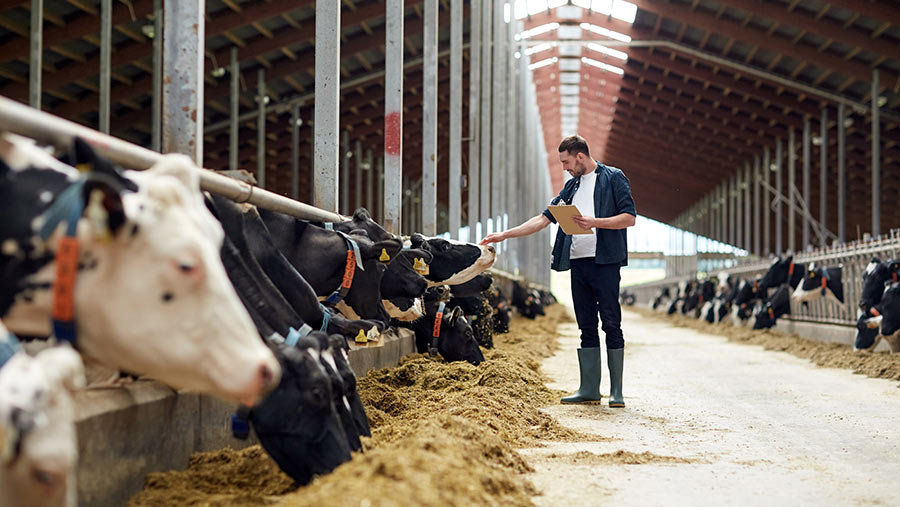Dairy farmer’s recruitment study focuses on neurodiversity
 © Syda Productions/Adobe Stock
© Syda Productions/Adobe Stock A diagnosis of attention deficit hyperactivity disorder has led a Staffordshire contract dairy farmer to explore ways farms can make the most of the wide-ranging skills neurodiverse people have to offer.
Liz Haines is convinced communication skills, together with self-awareness, help to improve interactions on farm with staff and family.
She wants to take this one step further and recognise the potential of people with neurodiversity (such as attention deficit hyperactivity disorder (ADHD), autism and dyslexia) in farming.
See also: Farm managers’ award-winning ways with staff
By understanding more about how such people interact with and experience the world, Liz believes that farming can support them to develop strategies that help them achieve their potential.
In return, businesses will benefit from unique perspectives, creative solutions to problems, and a vibrant workforce.
Focus on strengths
Liz has chosen to explore this topic in her Nuffield scholarship. “My personal experience leads me to think [neurodiversity is] more common than in the general population, but there are no statistics on it.
“Some [neurodiverse] people are attracted to job roles that are not rigid nine to five; being practical, working outdoors, being with animals appeals,” she says.
“As employers, the more we try to understand, the more we can fully connect with our staff. Yet we shouldn’t just focus on their struggles, but what strengths they bring to the workplace.
“We need different ways to think about things. Creating environments where people can thrive will help our recruitment crisis.”
It was Liz’s ADHD brain that launched her into the world of dairy farming with her husband Nick, she says.
Having studied English and worked in publishing, she made an impulsive decision to quit her job and take a risk.
“It was a case of why not have a go? This is my risk side; in other ways, it can lead people to drive too fast or take drugs. The entrepreneurial side of me meant I plunged in and invested my money.”
After a six-year stint contract farming in Shropshire, the couple now run a 400-cow spring block calving herd with two business partners in Staffordshire.
Better understanding
Understanding more about herself, Liz realised that ADHD affects everything in her life.
“It’s a whole-person thing. For instance, I have issues making eye contact with people and have sensory issues with food, such as I can’t stand the texture of raw fruit; these things are often linked to autism.”
After her own diagnosis, Liz decided to cut herself some slack – she says there is often a lot of shame for people who are somehow “different”.
Instead, she found ways to help herself. “I hate paperwork and organisation. I realised I’m not good at keeping things clean and not good at calf rearing.
“I tried to hide it and present a façade of a super-efficient person.
“The point is to find a strategy to deal with it. It’s taking time.
“But I am a more visual person than I realised, so I now use a whiteboard on the fridge and write on tasks, or places I need to be for the day, little things that have to be done.”
Understanding personality profiling is useful for everyone. However, Liz says it is important not to pigeonhole anyone.
Neurodiverse people still fit into personality categories, but they may show more extreme behaviours.
Ultimately, she says it is all about learning how people communicate and think, then treating them how they want to be treated. Sharing experiences and offering appropriate support removes the stigma.
Task-based interviews
For her, this process starts at recruitment: traditional interviewing techniques do not help many neurodiverse people, she says.
When employing new staff, Liz allows job applicants see the interview questions beforehand.
This lets them plan and prepare for the interview (she does this for everyone, so no one is disadvantaged).
“It is also important to be clear in instructions. Giving people a task-based interview means I can judge them while they do it and they can show their capabilities.
“Look at what people can do, not what they can’t,” she explains.
Neurodiversity Week runs until 24 March. More information is at www.neurodiversityweek.com.
Read more about neurodiversity on the ADHD Aware website.
Liz Haines’ Nuffield Scholarship
Liz Haines plans to visit Scotland and Ireland to speak to farmers and look at diversity projects.
In the US, she is keen to find out more about autism from Prof Temple Grandin at Colorado State University, and learn from Silicon Valley tech companies that run autism programmes.
She would like to find out how other countries support neurodivergent individuals, what training programmes and practical strategies exist, and what can be learned from other industries.
